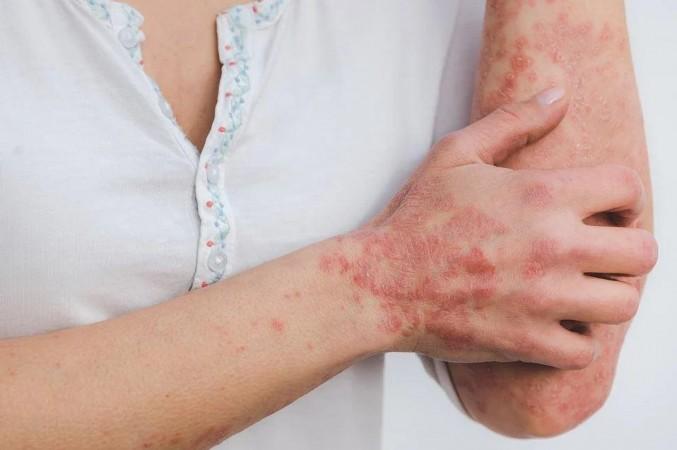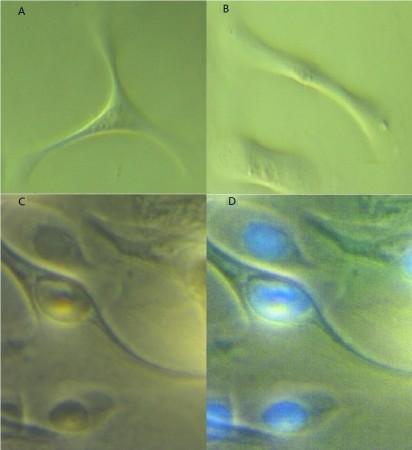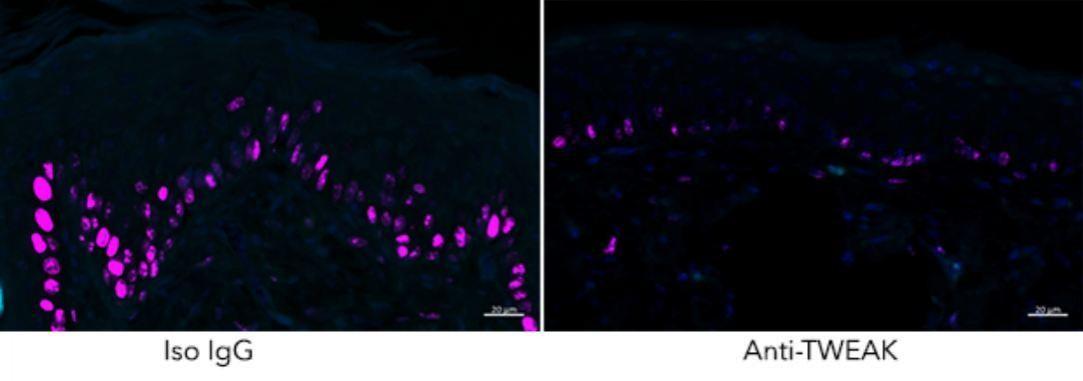Psoriasis is a skin disease that affects millions of people across the world. Being a life-long condition, sufferers have no choice but to bear with painful skin inflammation in regular cycles. Now, scientists have found that a signaling protein (or cytokine) along with two other proteins is responsible for skin damage in patients with the ailment.
According to a new study by researchers from the La Jolla Institute for Immunology, a cytokine known as TWEAK works along with two other proteins—tumor necrosis factor (TNF) and interleukin-17 (IL-17)—to trigger skin inflammation in individuals suffering from psoriasis. Using a mice model, it was also gleaned that targeting TWEAK may potentially aid in controlling the disease.
"We think TWEAK might be considered a potential target for the treatment of psoriasis. It's good to have this chance to develop a new therapeutic option," said Dr. Rinkesh Gupta, first author of the study, in a statement. The findings were published in the journal Science Immunology.
A Life-long Condition

Psoriasis is an autoimmune disease that affects the skin. It is characterized by painful red scaly rashes where the skin is inflamed. The condition causes the growth of skin cells at a highly accelerated rate. It occurs in cycles with flare-ups that last for weeks or months followed by abatement or remission.
While treatments exist to manage the condition, there is no cure for it. Hence, it is a permanent disease. "These therapies don't reduce disease by 100 percent, and they don't cure the disease. And if you take patients off those drugs, the disease almost always comes back," stated Dr. Michael Croft, co-author of the study.
Tumor necrosis factor-like weak inducer of apoptosis (TWEAK) has several biological functions such as induction of inflammatory cytokines, angiogenesis, and stimulation of cell growth. The current study builds on the findings of a previous study led by Dr. Croft.
In the research, the team found that TWEAK interacts with keratinocyte, the most common variety of skin cells. Through the scrutiny of mice that were deficient in TWEAK, it was learnt that TWEAK served as a driver of inflammation in the psoriasis model used.
Trio of Damaging Proteins

For the new study, the researchers studied human keratinocytes extensively. Their investigation revealed that TWEAK did not work alone and that it teamed up with two other proteins to trigger skin inflammation: TNF and IL-17. TNF is a multifunctional and pro-inflammatory cytokine that plays a crucial role in several cellular functions such as cell death, differentiation, survival, and proliferation.
IL-17 is also a pro-inflammatory cytokine that is secreted by T-helper cells known as T helper 17 cells (Th17). This protein triumvirate appeared to regulate the production of molecules that were inflammatory in nature such as IL-23 and also the expression of other inflammation-related proteins (S100A8/9 and SERPINB1/B9) in patients of psoriasis.
"The fact that they work together suggests the disease is essentially driven by all three of those particular proteins at the same time. The primary implication is that TWEAK will also be a good drug target. as has already been proven for TNF and IL-17," stated Dr. Croft.
Inhibiting TWEAK
Turning to a mice model of psoriasis again, the authors sought to contrast the efficiency with which a TWEAK-inhibitor functioned in comparison to therapies that inhibit IL-17 or TNF. They found that treating these mice with anti-TWEAK compounds was as effective as the antibodies used against IL-17A or TNF in decreasing immunological and clinical features of psoriasis-like skin inflammation.

Also, the combined targeting of TWEAK and either of the two cytokines did not demonstrate a greater inhibitory effect. This reinforced the team's finding that the three cytokines worked together indeed. Dr. Gupta, explained, "If you inhibit TWEAK from working on its receptor on keratinocytes, you get the same therapeutic effect as when you inhibit TNF or IL-17." The finding is also particularly significant as both TNF and IL-17 are drug targets approved by the FDA for treating psoriasis.
Potential to Treat Multiple Conditions
While human clinical trials are yet to be conducted, the authors expressed that the use of TWEAK inhibitors as therapies against different types of skin problems is likely in the future. "We think TWEAK is involved in skin inflammation in general," stressed Dr. Croft.
What is the next step in the research? The team is examining the role of TWEAK in eczema, also known as atopic dermatitis. It is a common form of skin irritation that particularly ails young children and babies.
Dr. Croft noted that while eczema and psoriasis are distinct diseases, they share several similarities. Much like psoriasis, not many effective treatments exist for managing eczema. "There's certainly a lot of room for improvement in the treatment of atopic dermatitis patients," he concluded.

















